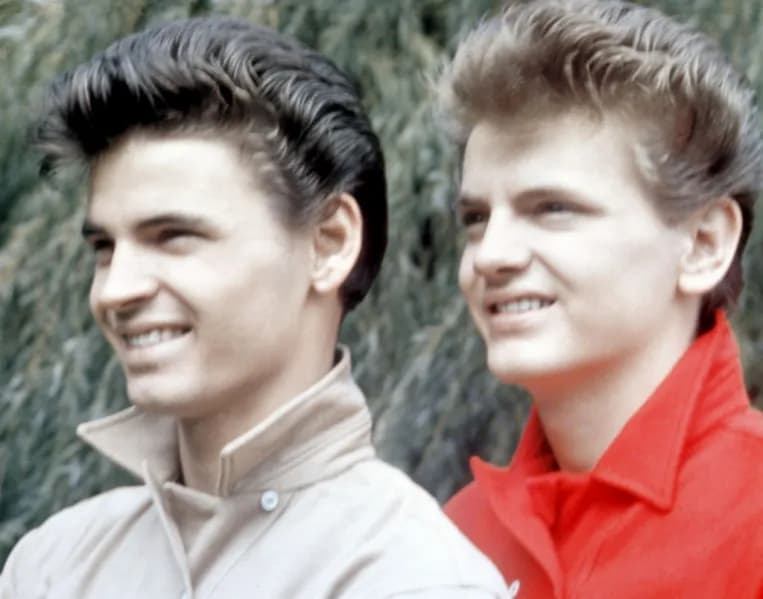
The Everly Brothers’ “Down in the Willow Garden”: A Chilling Echo from the Past
There are songs that, upon first listen, feel instantly familiar, like a half-remembered dream or a fragment of an old tale whispered on the wind. And then there are songs that, despite their age, retain a startling potency, a stark beauty that can send a shiver down your spine. The Everly Brothers’ rendition of “Down in the Willow Garden” falls squarely into this latter category. Released in 1958 on their seminal album Songs Our Daddy Taught Us, this haunting ballad wasn’t a chart-topper in the way their other rock and roll hits were. In fact, it wasn’t released as a single at all. Instead, it carved its niche as a deep album cut, a testament to the brothers’ fearless exploration of the darker, more traditional corners of American folk music. Yet, its absence from the popular charts does nothing to diminish its chilling impact or its enduring legacy, especially for those of us who appreciate the authentic roots of country and folk.
Cast your mind back to the late 1950s. While rock and roll was electrifying a generation, the Everlys, with their impeccable harmonies, also had a profound respect for the older sounds, the melodies and narratives passed down through generations. The story behind “Down in the Willow Garden” is not one of a specific songwriting session in a Nashville studio, but rather a journey through the murky depths of traditional folk. This song, also known as “Rose Conley” or “The Cursed Love,” is a murder ballad, a genre steeped in centuries of oral tradition. Its origins are shrouded in the mists of time, likely stemming from British Isles folk songs brought over to Appalachia by early settlers. The narrative, grim and stark, tells of a man who poisons his beloved, then drowns her, driven by a desperate, possessive love or perhaps a desire to escape some dire consequence, often hinted to be an unwanted pregnancy. The Everly Brothers, with their clean-cut image, bravely delved into this dark material, presenting it with a chilling detachment that only amplified its horror.
The meaning of “Down in the Willow Garden” is multifaceted and deeply unsettling. On the surface, it’s a cold-blooded tale of murder. But beneath that, it’s a stark portrayal of the destructive power of obsession, the fragility of life, and the brutal consequences of impulsive, desperate acts. It speaks to a darker side of human nature, a timeless fascination with transgression and tragedy. The song serves as a cautionary tale, a narrative warning whispered from generation to generation about the perils of unchecked passion and the inevitability of justice, even if it’s only in the ethereal realm of a ballad. For those of us who grew up hearing these old folk songs, often sung in hushed tones, “Down in the Willow Garden” carries the weight of history and the echo of forgotten sorrows. It reminds us that storytelling, even in its most gruesome forms, has always been a way for humanity to grapple with its own shadows.
What makes The Everly Brothers’ rendition so singularly effective is their signature close harmony, which, in this context, takes on an almost spectral quality. Don and Phil’s voices, usually so bright and intertwined, here create a haunting, almost disembodied sound. It’s as if two specters are recounting the dark deed, their voices blending seamlessly to form a single, chilling narrative voice. There’s no overt emotion in their delivery; instead, there’s a detached, almost journalistic recounting of the events, which only makes the brutality of the lyrics more impactful. The sparse acoustic accompaniment, a simple guitar, further accentuates the starkness of the tale, leaving nowhere for the listener to hide from the uncomfortable truth presented. It’s a masterclass in how to convey profound disquiet with minimal fuss, relying instead on the power of the narrative and the purity of the vocal performance.
“Down in the Willow Garden” stands as a powerful reminder of The Everly Brothers’ breadth as artists. Beyond the pop hits that defined their commercial success, they possessed a deep reverence for the traditional music that shaped their upbringing. This particular track is a gem for those who delve beyond the obvious, offering a glimpse into the raw, unvarnished heart of American folk. It’s a song that lingers, long after the final note fades, prompting reflection on the darkness that can reside within, and the enduring power of a story well told, even one so grim. For older ears, it resonates not just as music, but as a piece of cultural history, a chilling echo from a time when tales of woe were sung as lessons and warnings, passed down like precious, if unsettling, heirlooms.